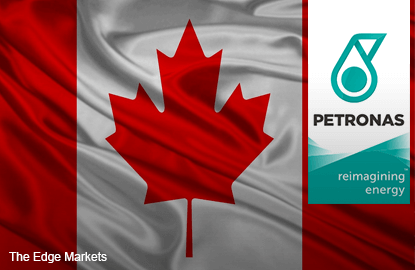
KUALA LUMPUR (March 9): Canada’s new climate change priorities could spur an irate Petroliam Nasional Bhd (Petronas) to abandon the US$36 billion Pacific NortheWest liquefied natural gas (LNG) project in northern British Columbia, if it fails to get Canadian federal government approval by March 31.
Petronas, which has so far spent US$12 billion to get the project to the current stage, is said to be subject to the new federal Liberal government policy introduced by recently-elected Prime Minister Justin Trudeau, said a report by Canada-based Financial Post on March 7.
Quoting a source close to the project, the publication said the new government was `toughening up environmental reviews of major energy projects to regain public trust’, while trying to meet international commitments on greenhouse gas emissions.
This has thrown a spanner into the works for Petronas, which said in a note to its staff that it would cut RM20 billion on capital and operating expenditure up to 2020, in January, followed by a reduction in workforce by 1,000 last week to cope with the oil rout globally.
Petronas also said part of its business strategy would involve deferring some of its projects, but did not specify which ones.
The Canadian project, expected to take place on federal lands on Lelu Island near Prince Rupert, has apparently undergone multiple delays and setbacks, including opposition from aboriginal and environmental groups, Financial Post said.
Petronas is believed to have conveyed to the federal cabinet ministers that it would not accept additional hurdles.
Last month, Petronas received a favourable assessment from the Canadian Environment Assessment Agency (CEAA), after being given the approval by the British Columbian government in November 2014, said Financial Post.
CEAA, in its draft report, concluded that the project would likely cause significant adverse effects on harbour porpoise as a result of greenhouse gas emissions, but was `not likely to cause significant adverse environmental effects, taking into account the implimentation of key mitigation measures’, Financial Post wrote.
“They have given Trudeau to March 31 to either approve it as it stands now, or they are going to leave. They started off with the Conservatives, and the (environmental) standards are very high. They said OK, we will meet those standards, and they did in all the engineering and design of the project. This last greenhouse gas thing that Trudeau came up with, really threw them for a loop.
“The big worry is that the cabinet, which has [the] final say, will keep stalling instead of handing down a decision, while the project continues to burn cash,” said the source to Financial Post.
According to the publication, Petronas and its partners — China Petroleum and Chemical Corp or Sinopec Ltd, Japan Petroleum Exploration Co, India Oil Corp and state-owned Brunei National Petroleum Company Sdn Bhd — were seen as most likely among two-dozen groups to move forward with LNG exports, as they have customers and did not have the same profit expectations as shareholder-owned companies.
Financial Post said the other groups could not go ahead due to regulatory delays, rising competition from US LNG exporters, plummeting prices, and aboriginal environmental group opposition.
In response to the publication’s question, a Petronas spokesman said it was `business as usual’, while highlighting Petronas president and group chief executive officer Datuk Wan Zulkiflee Wan Ariffin’s statement on Feb 29.
“As far as the Pacific Northwest LNG project in Canada is concerned, we continue to work towards achieving full FID (final investment decision). We are reviewing the draft report (of the CEAA), including the conditions,” said Financial Post, quoting Wan Zulkiflee.